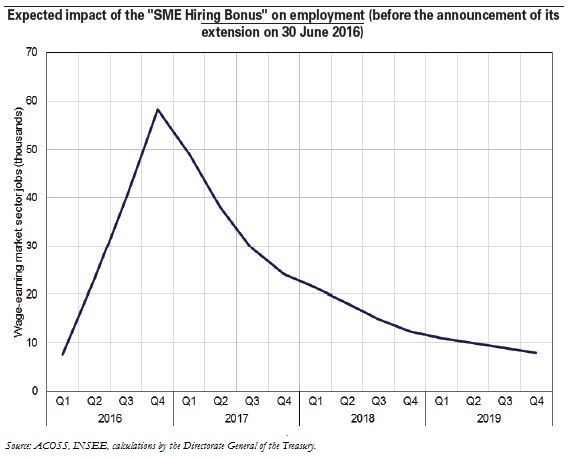Trésor-Economics No. 177 - How effective are hiring subsidies for boosting employment?
A hiring bonus reduces labour costs and increases employment levels. Such bonuses are in line with earlier measures to reduce labour costs implemented in France over the last 20 years, including cuts in social contribution rates, the Competitiveness and Employment Tax Credit and reduced Social contributions under the Responsibility and Solidarity Pact. Unlike the previous measures, the hiring bonus targets hiring directly, which means that it has an impact on flows of new jobs, rather than stocks of jobs. This type of targeting amplifies the short-term effectiveness of the measure in terms of job creation.
Some hiring bonuses are limited to open-ended contracts or long fixed-term contracts (as is the case for Italy's 2014 Jobs Act or the "SME Hiring Bonus" measure implemented in France on 18 January 2016). These rules prevent greater segmentation of the labour market while boosting job creation.
Hiring bonuses may be permanent measures, as is the case for many of the subsidies introduced by different American States in the 1990s, but they are usually temporary measures to provide cyclical support, which means that their impact on employment can be more rapid.
More specifically, the temporary nature of the bonuses means they provide an incentive to create jobs immediately in uncertain economic times, rather than waiting for better days. The temporary nature of some of these hiring bonuses, such as America's 2010 Hire Act or France's 2009 "Zero Contributions for VSEs" measure, has recently led economists to examine the multiplier effect of these measures on employment levels, growth and prices. They have found that the impacts have been broader than those associated with conventional expenditure multipliers.
The latest hiring bonus, implemented on 18 January 2016 could lead to 110,000 additional new hires in 2016. Even when the employment contract terminations occurring during the year are taken into account, as fixed-term contracts expire and open-ended contracts are terminated, the ultimate contribution to job creation will be significant. It was estimated at 60,000 additional new jobs by the end of the year, before the one-year extension of the bonus was announced on 30 June 2016.
